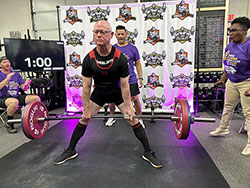.jpg)
Evie and Mark VanderMeer
Grief, the last breath
We were all together, living, breathing and touching one minute. But with one last sigh from this living and loved being, the final silence came. It was a strange thing to sit at the bedside of my cherished husband knowing that these were his last moments here on earth. Our family had been anticipating this final moment, but no amount of anticipating our losses prepared me for the silence and vacancy as my husband moved from this world into the divine wholeness and love he would be experiencing in heaven. Previously, with each cognitive change and loss of abilities I intentionally marked the losses on this four-year journey through younger-onset dementia. In my quest to be equipped for this finality I combed through books and listened to others whose wisdom had come from their own suffering and final loss. I thought I could somehow pre-empt the long journey of grief by doing my emotional and mental work before the finality of death. I was wrong. Acknowledging and anticipating grief is good thought and heart work. But it doesn’t replace the emptiness that follows.
Grieving after the death of a loved one covers the full range of emotions. There aren’t enough emotions to tell the full story. It’s not uncommon after a disease has ravaged the body or brain for the family to experience a time of relief knowing the suffering is over. We were selective with whom we shared that feeling because we feared being misunderstood. Most people shy away from being honest about the great withdrawal in our bodies of purpose, companionship, connection, and the living memories which are cascading out like a raging river. We are left feeling stupefied, stunned, foggy, and vacant. Emotional and physical pain are tangible and reap havoc on our immune systems. The body takes on a new experience of fatigue, lack of energy, and weakness or an aversion to noise. Too often friends slip away for fear of what to say, not grasping the power of presence.
Sludging through the work of grief requires a choice to keep moving and a new level of honesty. As care partners to our loved ones with dementia we need time to look back at the years of confusion and fear. It seemed like a lifetime of presenting a positive and uplifting demeanor while we are screaming, crying, or raging on the inside. What just happened to me, to us, our family? There is so little emotional space or time to take tend to our own needs when jobs, children, finances, and the disparities in our health systems crowd out everything else. Then there is the reconstruction of our identities. I remember thinking I am no longer the same person, but if that’s true, then who am I? What are my new roles? How will I do the things I have never had to do during the 42 years of our marriage? Am I willing to walk into social events by myself? Can I find others who like to play in similar ways as my past choices? How do I make it through the deafening silence in my house, my car, and my walks? Who will listen to me now, validate my feelings, be tender and loud and funny?
The best source of healing through grief is the connection and understanding found in support groups, grief therapy, socializing with other’s who embrace the ambiguity and will move with you from tears to laughter. Everything is irregular which sounds the same as damaged. But through the engagement of friends and strangers who willingly stepped into my rocky sphere I slowly discovered that I could feel love, offer love, and enjoy new ways of doing things. When other’s make intentional choices to engage with me in life, I found the strength and focus and build anew. I was not damaged and irreparable.
Death has not separated me from my life story with Mark and our families remembrance of wholeness with all of us at the table. But, as reality demands, I have found new patterns, a changed focus, and new friends. I’m always thankful when someone invites conversation about my life with Mark or our dementia journey. I love speaking his name and I love remembering. My life with my husband and his four years of dementia has now propelled me to seek out those who are under the shadow of this same disease. What joy it brings me to listen, encourage, be present, laugh and cry with them. It gives a strange kind of beauty to the awkward thing we call grief. Healing is possible.

Powerlifter Robert Moore breaks 8 world records to benefit The Longest Day. Read all about it
here.
Baltimore Sun health reporter Angela Roberts highlights the need for dementia training for first responders. Article here.